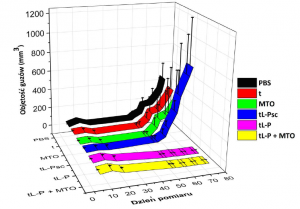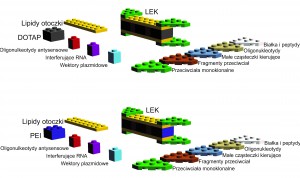
Fig. 1 The kinetics of tumor growth in vivo. Mice bearing tumor xenografts were treated with tL-P liposomes carrying antisense oligonucleotides targeted against BCL2 mRNA, or with control liposomes containing a scrambled oligonucleotide sequence (tL-Psc), free antibodies (t), or PBS. Tumor volume was calculated on the basis of caliper measurements according to the formula (tumor volume = length × width2)/2 (n=8). Error bars: +standard deviation (n = 8).
The research team from Department of Cytobiochemistry (Justyna Meissner, Monika Toporkiewicz, Aleksander Czogalla, Lucyna Matusewicz and Aleksander F. Sikorski) in collaboration with Kazimierz Kuliczkowski from Department and Clinic of Haematology, Blood Neoplasms, and Bone Marrow Transplantation of Wrocław Medical University, as a part of Biomed project (EIT+) developed two highly efficient liposomal anticancer drugs.
Liposomal antisense formulations appeared to completely destroy cancer tissues transplaneted to animals prior to treatment (Fig. 1). This is mostly due to specific recognition of cancer surface markers. Moreover, the structure of the carrier enables to use a variety of nucleic acid-based drugs together with broad array of targeting molecules. Similar to LegoR blocks, individual elements of the drug could be exchanged in case of need (Fig. 2)

Fig. 2 The LegoR-like approach to construct targeted anticancer drugs. The nucleic acid complexing agents (here: PEI or DOTAP) and lipids are the core of the carrier, but nucleic acid and targeting molecules are interchangeable.
A patent protection have been applied for both formulations. Our data have been published in Journal of Controlled Release.









